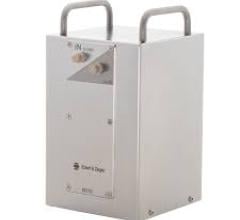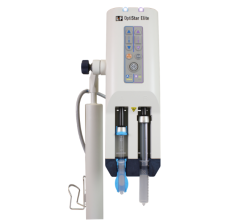July 29, 2008 – GE Healthcare reported results from a Phase I clinical trial of GE-067, a [18F]-labeled PET diagnostic imaging agent being developed by the company to assist in the detection of brain beta-amyloid were positive.
The results, presented today at the International Conference on Alzheimer’s Disease, Chicago, IL, by the principal investigator, Professor Rik Vandenberghe, of the University of Leuven, Belgium, show significantly greater brain uptake of GE-067 in Alzheimer’s Disease patients compared with healthy volunteers. The two hour half-life of the [18F] labeled ligand offers the potential for greater clinical accessibility compared with the research compound [11C] PIB.
[11C] PIB is now the most recognized and widely used research tool for imaging amyloid. A recent study2 from the Pittsburgh group of Klunk and Mathis has demonstrated that the in-vivo image seen with a PIB PET scan mirrors the distribution and intensity of amyloid pathology identified at subsequent autopsy. However, the [11C] labeled form of PIB has a short half-life (20-minutes), which hampers its potential as a routine clinical diagnostic agent. GE Healthcare has pioneered the synthesis of a PIB derivative labeled with [18F] in order to help overcome this significant barrier to potential clinical use. The [18F] form of the ligand, with a much longer half-life of 110 minutes, may offer greater clinical utility and wider accessibility to hospitals.
The Phase I study (presented using the chemical number [18F] AH1100690) consisted of 22 subjects who were injected with the agent GE-067. Initially six healthy volunteers had whole body scans to determine the radiation dose. A further eight healthy and eight probable AD subjects had cranial scans with significant amounts of uptake being observed in the probable AD brains compared to the healthy volunteers. These initial results suggest that GE-067 could be used to detect amyloid pathology in vivo and potentially contribute towards future diagnostic and treatment algorithms, subject to performance of confirmatory studies.
Don Black, Head of R&D, Medical Diagnostics at GE Healthcare said: “We were excited to see the results from this Phase I study with GE-067 and as a result have initiated a larger study with manufacturing and scanning centres across Europe. We also plan to extend our studies to the United States of America.”
Commenting on the results, Vandenberghe said, “The results of this Phase I trial are a very encouraging step forward in our quest to develop a clinically useful diagnostic imaging agent to assist in the early diagnosis of Alzheimer’s Disease and directly demonstrate in vivo the presence of abnormal quantities of beta amyloid in an individual’s brain. With the latest estimates of the incidence of Alzheimer’s Disease predicted to quadruple to 106 million by 2050 and with the potential development of amyloid – lowering therapies, there is a critical need for an effective diagnostic product to directly and reliably demonstrate the presence of amyloid deposits as early as possible during the course of the disease and ultimately improve the lives of patients and caregivers.”
For more information: www.gehealthcare.com


 October 09, 2025
October 09, 2025 









